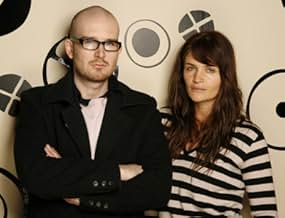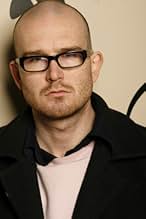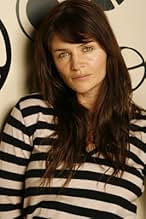Famous pianist Zetterström returns home to his native Denmark, to give a concert, just to find out that the choices he has made in his life have affected his love life greatly.Famous pianist Zetterström returns home to his native Denmark, to give a concert, just to find out that the choices he has made in his life have affected his love life greatly.Famous pianist Zetterström returns home to his native Denmark, to give a concert, just to find out that the choices he has made in his life have affected his love life greatly.
- Director
- Writers
- Stars
- Awards
- 1 win & 6 nominations total
Peder Thomas Pedersen
- Guard 1
- (as Peder Pedersen)
Susanne Storm
- Mor Til Dreng
- (as Susanne Storme)
- Director
- Writers
- All cast & crew
- Production, box office & more at IMDbPro
Featured reviews
I just had the chance to check out this excellent Danish film from 2005 that is just now being screened in our area, after a two year wait (better late than never). Allegro is a dreamy allegory about a (somewhat) eccentric concert pianist who left his home country after a failed romance, only to return there after receiving word via post card that his memories have been kidnapped and are being held in a metaphorical area called "the zone" in Copenhagen. What results is the pianist trying to come to terms with his past. The bravura cast is made up of Danish actors,who I had never heard of before,as was their director/co-writer,Christopher Boe. Without revealing too much more, I would have to say that Boe's style of directing reminded me if Jean Cocteau returned from the dead, and had the chance of directing one more film, and opted to make that film for DOGME productions, it would look a whole lot like Allegro (it has that DOGME look, i.e. a grainy, kitchen sink,almost home movie kind of look,which is what I always admire about DOGME---what ever happened to DOGME productions,anyway?). This film will entrance some, while others will scratch their heads and say "what the hell is this all about?". What I also admired was the fact that the film is not just all seriousness. It has a sense of humour,too. You may have to do a bit of searching around to find this little understated gem (it's probably best seen on a theatrical screen, proper--but DVD will work, too), but will be well worth seeking out.
There's a fine and potentially powerful sci-fi-as-metaphor idea at the heart of this film: the notion that the painful memories you wish to repress might be actually taken from you and placed somewhere ("The Zone," a la Tarkovsky's Stalker).
The trouble is, the film is not told from the point of view of the protagonist. His emotional journey would have been powerful if the audience had been *asked to share it.* Why can't I remember more than ten years back? What happened ten years ago? What connection, if any, does my memory lapse have with the mysterious region in my former home city called "The Zone"? Who is the woman in this picture: might she be a lover I have somehow forgotten? Unfortunately, while all of these things are puzzling to our hero, the answers have already been spelled out for us, because the story has been told in a linear fashion, and is actually narrated by an omniscient voice who explains everything point-by-point, essentially before it has happened. This greatly reduces the movie's emotional impact: we are now a passive observer rather than an active participant.
It is, in other words, the anti-Memento. I've long been championing the artistic cause of puzzle movies like that one, and Donnie Darko, Eternal Sunshine, and Upstream Color ... because real life is a puzzle that lacks an omniscient narrator. I wish Boe had trusted his audience much more and dared to tell this from the proper POV: that, and better casting of the female lead, would have made this an 8/10. As it is, it is worth seeing more as an argument in favor of more challenging narrative structures.
The trouble is, the film is not told from the point of view of the protagonist. His emotional journey would have been powerful if the audience had been *asked to share it.* Why can't I remember more than ten years back? What happened ten years ago? What connection, if any, does my memory lapse have with the mysterious region in my former home city called "The Zone"? Who is the woman in this picture: might she be a lover I have somehow forgotten? Unfortunately, while all of these things are puzzling to our hero, the answers have already been spelled out for us, because the story has been told in a linear fashion, and is actually narrated by an omniscient voice who explains everything point-by-point, essentially before it has happened. This greatly reduces the movie's emotional impact: we are now a passive observer rather than an active participant.
It is, in other words, the anti-Memento. I've long been championing the artistic cause of puzzle movies like that one, and Donnie Darko, Eternal Sunshine, and Upstream Color ... because real life is a puzzle that lacks an omniscient narrator. I wish Boe had trusted his audience much more and dared to tell this from the proper POV: that, and better casting of the female lead, would have made this an 8/10. As it is, it is worth seeing more as an argument in favor of more challenging narrative structures.
Inspired by having seen the provocative Reconstruction last year, I watched Allegro last night and found it to be just spectacular. I think Boe is one of those amazing Renaissance people, whose skills crossover like blossoming fireworks.Above all else, I appreciate his concepts, which become his story lines.Supporting them is his very idiosyncratic visual style. The film is dark and moody, like its protagonist, and there is little dialogue. Long contemplative shots are frequently interrupted by a barrage of split-second images- the equivalent of memory flash cards. The cartoon story that plays during the film's introduction- tells the simple story one is about to see unfold. It's basically a one sentence story about the necessary role that deep feelings play in the life of any great artist. I see that simple story as a spider, and the ensuing film as the web around the spider. I particularly like it that the narrator clearly tells us, at the very beginning, what the film is about, and then we spend the next hours watching that spider web be built and travelled. What a fascinating world Boe creates.
I must say I am very surprised to have not seen much IMDb discussion of this film . I only hope that many more people will soon have the pleasure of its experience.
I must say I am very surprised to have not seen much IMDb discussion of this film . I only hope that many more people will soon have the pleasure of its experience.
I went out from the cinema crying. The movie, as all movies in my opinion, removes inside you what you let be removed... I am only 28, and yet, this movie reminds me of how many memories I want to hide, forget, just because my life is based on "keep on living, keep on acting as you decided, don't turn back, because this is imperfection". I don't think the movie is excellent, but it has a specific message (art is made of passion and passion is made of each one's history) and it knew how to express it, how to deal with this psychological side each one of us has. Also the music, mainly J.S. Bach, is beautiful. This is the kind of movie that I would call "of the moment", maybe you won't remember it in a few months, but it inspires you and lives with you unconsciously as a psycho therapy does.
I'm a big fan of existential folly in film, especially having completed many of my own. Zetterstrøm is the main character in this movie, a world-renowned pianist from Denmark. Since childhood, he is an assiduous "forgetter" of everything except his piano playing. This is to say that he stores up his disappointments, forgets them, and retreats behind a piano. After a love affair that ends due to his emotional constipation, he uses his facultative amnesiac skills once again, and this act is one step too far, so inimical to the fabric of reality, that a rent in reality is formed over three city blocks, and becomes referred to as the "Zone".
Zetterstrøm buries himself in his solitary existence of piano-playing, quite literally performing concerts in the dark, or behind screens so that the audience cannot see him. Shadowy figures draw Zetterstrøm back to the zone, unwilling to allow his non-confrontational existence to continue. Zetterstrøm must be made to confront his past.
It's a fascinating film, the narrator lets us know that it's Zetterstrøm's very brilliance which allows him to annihilate himself, that allows him to inoculate himself from reality.
I'm in absolute adoration of films that attempt to make visual metaphors of the human mind, such a film is this (the Zone fulfils this purpose), Tarsem films such as The Cell and The Fall are others. There is no subject more sacred, more revelatory as regards human potential. There's a scene where Zetterstrøm sits and has dinner in an ornately plastered ballroom. The windows and floor are all blacked out with plastic sheeting, and the room is covered in latched boxes loaded on pallets, representing Zetterstrøm's repressed past, there's also a cage with globes of light in, recognising the potentiality of his mind.
When there's narration we also see some very nice cartoons with Zetterstrøm as a child, that's another metaphor I'm very fond of from The Cell, that many of us are still children inside, just wounded, subdued, and with horrid barriers put up. You may have guessed that this movie moved me deeply.
Zetterstrøm buries himself in his solitary existence of piano-playing, quite literally performing concerts in the dark, or behind screens so that the audience cannot see him. Shadowy figures draw Zetterstrøm back to the zone, unwilling to allow his non-confrontational existence to continue. Zetterstrøm must be made to confront his past.
It's a fascinating film, the narrator lets us know that it's Zetterstrøm's very brilliance which allows him to annihilate himself, that allows him to inoculate himself from reality.
I'm in absolute adoration of films that attempt to make visual metaphors of the human mind, such a film is this (the Zone fulfils this purpose), Tarsem films such as The Cell and The Fall are others. There is no subject more sacred, more revelatory as regards human potential. There's a scene where Zetterstrøm sits and has dinner in an ornately plastered ballroom. The windows and floor are all blacked out with plastic sheeting, and the room is covered in latched boxes loaded on pallets, representing Zetterstrøm's repressed past, there's also a cage with globes of light in, recognising the potentiality of his mind.
When there's narration we also see some very nice cartoons with Zetterstrøm as a child, that's another metaphor I'm very fond of from The Cell, that many of us are still children inside, just wounded, subdued, and with horrid barriers put up. You may have guessed that this movie moved me deeply.
Did you know
- Quotes
Zetterstrøm: - But what now... now that I regret?
Tom: - It's a bit late for that, I am afraid.
Zetterstrøm: - So, what do I do now?
Tom: - Well, you can go back to your music, if you want.
- ConnectionsReferenced in iChat mellem Boe og Wulff (2006)
Details
Box office
- Budget
- DKK 10,000,000 (estimated)
- Gross US & Canada
- $7,404
- Opening weekend US & Canada
- $505
- May 13, 2007
- Gross worldwide
- $10,208
- Runtime
- 1h 28m(88 min)
- Color
- Sound mix
- Aspect ratio
- 2.35 : 1
Contribute to this page
Suggest an edit or add missing content






























